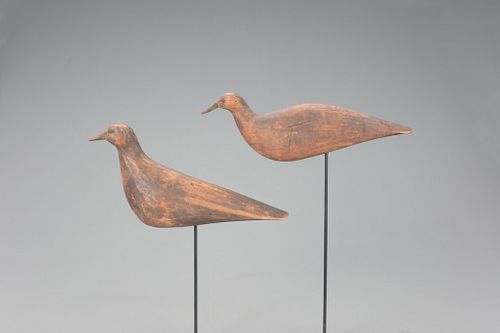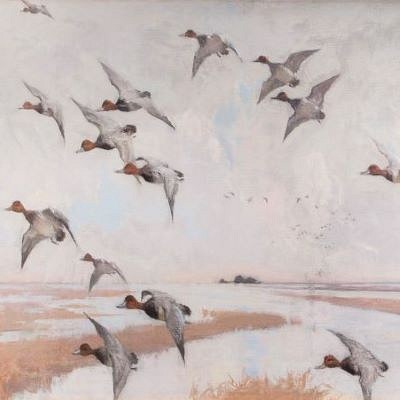Exceedingly Rare Passenger Pigeon Pair
About Seller
20 Winter Street
Pembroke, MA 02359
United States
Founded in 2005, Copley Fine Art Auctions is a boutique auction house specializing in antique decoys and American, sporting, and wildlife paintings. Over the course of the last two decades, the firm has set auction records for not only individual decoy makers, but also entire carving regions. Copley...Read more
Two ways to bid:
- Leave a max absentee bid and the platform will bid on your behalf up to your maximum bid during the live auction.
- Bid live during the auction and your bids will be submitted real-time to the auctioneer.
Bid Increments
| Price | Bid Increment |
|---|---|
| $0 | $50 |
| $1,000 | $100 |
| $2,500 | $250 |
| $5,000 | $500 |
| $10,000 | $1,000 |
| $25,000 | $2,500 |
| $50,000 | $5,000 |
About Auction
Feb 19, 2021
Lots 1-292 Copley Fine Art Auctions cinnie@copleyart.com
- Lot Description
New Jersey, c. 1880
12 1/2 in. long
In "Elmer Crowell: Father of American Bird Carving," authors O'Brien and Olney write, "It is estimated that the passenger pigeon was once the most abundant land bird species in North America...Less than fifty years later, in 1914, Martha, the world's last living passenger pigeon, died in the Cincinnati Zoo." As a result of this species' extinction due to human pressures, passenger pigeons are among the rarest of all decoy species.
The only known rigmate to this pair is featured in a dedicated Authentic Passenger Pigeon Decoy page in "Classic New Jersey Decoys." In addition to three photos of the bird, the text includes "This is the only one of these that I have ever handled. Joe French's note on bottom of decoy reads; 'Only Old Pas Pig I own.'" That rigmate was obtained by Joe French after Bush's passing and it was subsequently acquired by legendary author and collector James R. Doherty.
The Bush pair exhibit two poses with long flowing tails and distinctive almond-shaped eyes. The undersides bear museum identification codes in red paint.
A caption on the back dust jacket of Mackey's "American Bird Decoys" notes that real passenger pigeon decoys "are today almost as rare as these extinct birds themselves."
Original paint with gunning wear, some dings, and age lines.
Provenance: Walter L. Bush Collection
Collection of a New York City Museum, acquired from the above in 1953
Literature: James R. Doherty, "Classic New Jersey Decoys," Louisville, KY, 2011, p. 185, pl. 422-424, Doherty-French rigmate illustrated. Stephen B. O'Brien Jr. and Chelsie W. Olney, "Elmer Crowell: Father of American Bird Carving," Hingham, MA, 2019, p. 161, passenger pigeons discussed. William J. Mackey, William J. Mackey Jr., "American Bird Decoys," New York, NY, 1965, pp. 60-61 and back dust jacket, related pair illustrated and discussed.Please email condition report requests to colin@copleyart.com. Any condition statement given is a courtesy to customers, Copley will not be held responsible for any errors or omissions. The absence of a condition statement does not imply that the lot is in perfect condition.Condition
- Shipping Info
-
Copley Fine Art Auctions does not handle the shipping of any items. Shipping is the sole responsibility of the buyer. Once your payment has cleared and we have received your shipping form, items may be released for shipment. Copley Fine Art Auctions, LLC shall have no liability for any loss or damage to such items. Buyers should allow up to four weeks for shipment.
Please be aware that internet bidders may NOT not pick up their items at the sale. Items will be available for pick up by appointment or by shippers five days after the sale.
-
- Buyer's Premium



 EUR
EUR CAD
CAD AUD
AUD GBP
GBP MXN
MXN HKD
HKD CNY
CNY MYR
MYR SEK
SEK SGD
SGD CHF
CHF THB
THB














